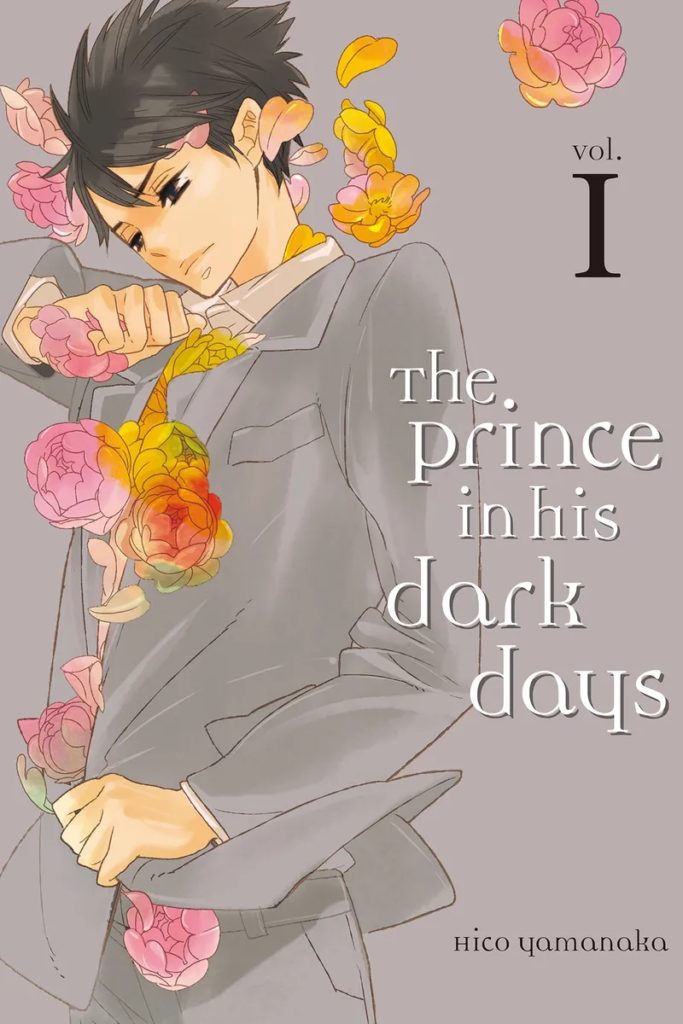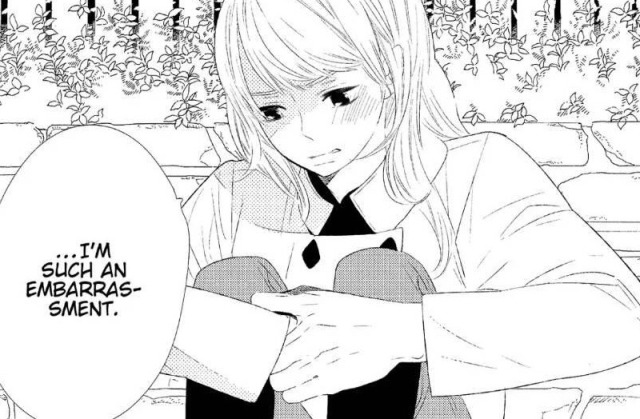Manga: The Prince in His Dark Days
March 11, 2022 · 1 comment
By Jeannette Ng.

One of the most arresting things about Hico Yamanaka’s manga The Prince in His Dark Daysis how profoundly wrong its protagonist, Atsuko, looks in a schoolgirl uniform in the opening chapter. It is what made the rather familiar prince-and-the-pauper identity-swap setup hypnotically compelling to me.
Atsuko Okawa is a struggling teenager who is making ends meet by tricking paltry sums and fast-food meals off “amateur photographers” looking to take upskirt photos. She also happens to share a face with Itaru Nogi, a veritable princeling from a wealthy family who has no small amount of emotional baggage of his own. A chance meeting and an impulsive, ridiculous demand from Itaru later, the two swap clothes, but it isn’t until Itaru’s disappearance that Atsuko is recruited by Ryo Sekiuchi to masquerade as Itaru full-time. Atsuko thus moves into the Nogi estate, but all the opulence belies a world of strained familial relationships and desperate secrets.

Spanning four volumes, The Prince in His Dark Days is a remarkably compact story, fitting a wide sweep of heart-wrenching emotion in its length. I was absolutely riveted but at the same time, the ending feels almost too neat. There are insinuations and foreshadowing that don’t quite come to fruition. Everything wraps up, our respective dark princes all find some measure of redemptive impulses and everyone returns more or less to their correct place within society. It’s not that I feel unhappy about the hopefulness of the ending and much of me wants desperately to believe in it, I also find it hard to square with the beginning and that glorious murkiness of the middle chapters when everyone seems to be deeply undecided about who they are, what they want and why they are even doing all the things they are doing.
The art has that usual lanky shojo look with sharp faces, sharper noses and many a meaningful glance. Dark eyes and awkwardly folded bodies convey worlds of emotion. There is a terse grittiness to its texture, just always a little bit darker than I expect in the details about Atsuko’s home life (such as her father trying to get her to do “compensated dating” for money) or what Itaru gets up to as teenage runaway.
Each of the four characters — Itaru, the prince; Atsuko, the imposter; Ryo, the usurper; and Nobunari, the loyal retainer — possess somehow immense, unshakeable conviction but at the same time, a constant uncertainty as to their own motivations. They hurl themselves into situations not fully understanding what primal force within them is propelling them to act in such society-cleaving ways. Each is in turn selfish and selfless, protective and passionate.
Beyond the more episodic drama of luxurious parties, spiteful socialites and a malicious rumour mill, the story that unfolds is their stumbling path to some measure of self-knowledge. It is also that palpable murkiness is that makes me doubt any of the neat conclusions that are offered. When Atsuko asks Ryo why he is so very protective of Itaru, none of the answers he offers quite feels enough and question is revisited again in a few more chapters. Is it Atsuko-as-Itaru that he cares for, Itaru himself or it is more the abstract princely ideal of Itaru as heir to the Nogi Group? Why is Atsuko so utterly committed to playing the role of Itaru? Is it really just the money and an obsessive work ethic or is there something more? Each time these questions are posed, there is a temptation for me to read between the lines and find answers of my own.

Which brings me back to Atsuko and the extreme awkwardness with which she is drawn in the opening chapter. Her face feels so mismatched with her own body that it is easy to read into the lines of the art a sense of gender dysphoria and later, when Atsuko is in Itaru’s clothes and becomes a lanky, beautiful boy, there is a sense of things just clicking into place. At the same time, Itaru’s mirror story is all about the prince becoming Nickie (Niki for short), working as a “drag princess” at a bar and flirting with patrons for money. As well as falling in love with the protective Nobunari. Thus are matters of performance, identity and gender are all deliciously and intriguingly tangled up.
But the dialogue never quite directly acknowledges a fully trans reading for Atsuko, even though the teenager is throwing every fibre of her being into fully embodying Itaru, working out and even smoking in hopes of ruining her vocal cords enough to sound passably male. Atsuko weathers their own profound discomfort of physical contact with other humans to protect the façade. As the characters interrogate each other’s true motivations, it always feels like we are dancing around an obvious answer. But it just never quite coalesces and by the final volume, everyone has paired off like the people in a Shakespearean comedy. Atsuko is again in a woman’s weeds and Itaru seems comfortably returned to his masculine self and princely state with his family’s apparent acceptance of his “hobby”. The festival of fools has passed and the dark days have come to a close; the world is righted. A domestic bliss that seemed impossible just chapters ago envelopes the characters.
Still, I cannot help but want more for these characters. Or at least, believe I had glimpsed more.
Jeannette Ng is the author of Under the Pendulum Sun. The Prince in his Dark Days is can be sampled in English at Azuki.co.
me
September 30, 2022 4:56 pm
The main character of this manga is extremely poor, to the point where expired ramen is supposed to be a special treat, she's bullied at school, the one guy who kind of tried to stand up for her secretly also thought she was disgusting, she isn't shown to have any friends, teachers are awful to her, and her father is not a good parent. Atsuko has nothing to live for, besides the hope of maybe getting a low-paying job at a convenience store once she's old enough. Just think about that. Then she gets the chance to do a job that will not only give her a lot of money, but fancy meals every day, and even... the means to bathe regularly, something she didn't have before. So she wants to do this job right, because not only will she get in trouble if she messes up, Nobunari would also get in trouble, and Nobunari is probably the only kind person she's encountered in years, possibly since she last saw her mother. And yet, no matter what motivations or backstory a character has, people throw it all out the window and decide that any character who cross-dresses must be trans or would be better that way! And even if a character had no real reasons, well, sometimes clothes are just clothes, and hair is just hair, etc. and that's how it ought to be.